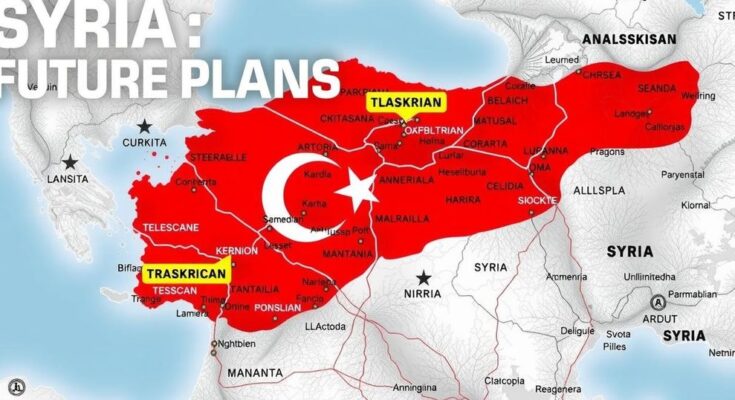Turkey has rapidly increased its influence in Syria following the unexpected collapse of the Assad regime. The country is positioning itself to lead governance efforts amidst ongoing military operations and seeks to facilitate the return of millions of Syrian refugees. Ankara aims to navigate complex relations with various factions, including the SDF, while establishing a framework for reconstruction and reconciliation in post-Assad Syria.
The recent upheaval in Syria, particularly the swift collapse of Bashar al-Assad’s government, caught Ankara somewhat off guard despite long-held assumptions about Assad’s inevitable downfall. The sudden fall of the Syrian military led Turkish officials to launch a limited operation against Assad’s regime, with the intention of countering repeated attacks on residential areas in Idlib. However, this operation rapidly intensified, resulting in Turkey emerging as the preeminent power in Syria. Turkey’s strategy has included an open call for dialogue between the existing Syrian government and opposition forces to maintain the state’s institutional framework, as evidenced by the actions of HTS leader Ahmed al-Sharaa, who has preserved governmental structures while promoting inclusivity amongst various sects.
Khaled Khoja, a notable figure in the Syrian opposition, asserts Turkey’s influence during this operation has been significant, aligning military initiatives with political objectives. Furthermore, Turkish officials have demonstrated adeptness in engaging Russia in discussions regarding Syria’s future governance, thus reinforcing Turkey’s strategic position. Can Acun, another expert, highlights Turkey’s dual goals of unifying opposition groups and establishing a representative interim government, based on successful governance models already developed in Northern Syria. The ongoing operations against ISIS and Kurdish groups have provided Turkey with a framework to potentially guide the reconstruction of Syria.
However, the presence of the U.S.-backed Syrian Democratic Forces (SDF) remains a point of contention for Turkey, as Ankara categorizes it as a terrorist entity due to its links with the PKK. Acun suggests military interventions could occur if the SDF maintains control over critical Arab-majority regions. Additionally, plans for the safe return of the millions of Syrian refugees in Turkey are underway, but their repatriation will hinge upon establishing security and rebuilding war-torn areas. The anticipated return of refugees is projected to be gradual and influenced heavily by socio-economic conditions and improvements in local safety.
As reconstruction looms on the horizon, Khoja underscores the significant financial need represented by pre-war estimates, highlighting the roles of organizations such as the OIC and Gulf states in funding recovery efforts. Turkey has positioned itself as a leader in this area, leveraging its local NGOs to support grassroots initiatives as the Syrian Interim Government transitions operations to recently freed areas like Aleppo.
The context of Turkey’s involvement in Syria is rooted in the longstanding conflict that erupted during the Syrian Civil War. Following the initial protests against President Bashar al-Assad, Turkey positioned itself as a principal supporter of various opposition factions. While Assad’s regime faced imminent threats, Turkey’s military and political engagement has been crucial in shaping the dynamics of the conflict. The developments of late, particularly the rapid territorial gains made by opposition forces, signify a transformative shift in power relations within Syria, prompting Turkey to reassess its strategies in order to secure its border and influence outcomes that align with its national interests.
The recent escalation of Turkey’s operations in Syria marks a significant shift in its regional influence as it seeks to stabilize the area post-Assad. Turkish leadership is focused on merging disparate Syrian opposition factions and facilitating a governance structure that accommodates all political views, while also addressing pressing humanitarian issues such as the return of refugees. Moreover, Turkey’s interactions with global powers, particularly Russia, illustrate a complex diplomatic landscape that will influence Syria’s future governance and reconstruction process. The expectations surrounding post-war recovery efforts highlight the necessary collaboration needed among regional actors to rebuild the war-affected country effectively.
Original Source: www.middleeasteye.net




